- Home
- Stephanie Bond
I Think I Love You Page 2
I Think I Love You Read online
Page 2
“Why did he run away?” Mica whispered, unfazed by the previous whomping. “And why isn’t Aunt Lyla moving?”
Justine’s pale-faced silence transferred pure terror to Regina. The blaring music gave way to a raucous commercial for a car lot. “Come on down to Alcatraz pre-owned cars in Monroeville! Our prices are so low, it’s a crime!”
“Let’s get the hell out of here,” Justine murmured, and clambered to her feet.
Regina stood and grabbed Justine’s arm. “Wait—Aunt Lyla might be having a heart attack or something. We can’t just leave her here.”
“How are we supposed to get down there?” Justine gestured wildly. “The road is at least a mile away, even if we cut through the creek. I say we scram.”
“Maybe we should flag down a car,” Mica said, chewing on a strand of dark hair.
“And say what?” Justine snapped. “That we spied while our aunt boffed a stranger? She probably just fell asleep, for God’s sake!” But the tremor in her voice belied her flip attitude.
“Aunt LY-LA!” Mica yelled through cupped hands directed toward the car. But her echoing voice was drowned out by the blaring radio jingle for Campbell’s Soup—“M’m! M’m! Good!” Their aunt didn’t move.
Regina nudged her glasses and looked around for a spark of inspiration—what would Nancy Drew do? Probably tie her becoming black pedal pushers, neat blouse, and white cotton socks into a rope and have her friends Bess and George lower her, clad only in sensible underwear and loafers, over the rock wall. But Regina didn’t trust the thread count of her cutoffs and T-shirt, nor the arm muscles of her girlie-girl sisters. Instead, she zeroed in on a sturdy maple tree that had grown from the floor of the clearing to a few feet past the rock ledge. About the diameter of a telephone pole and studded with enough limbs to likely support a clinging teenager. She walked over, grabbed a limb, and gave it a tentative shake.
“Are you crazy?” Justine said. “You’ll fall and break your fool neck. Then Mom will kill me for letting you.”
All roads led back to Justine. Regina retrieved her clothes and yanked them on over her damp suit, then jammed her feet into her tennis shoes. “Stand back.”
She’d waited her entire life to say those words. With a burst of courage, she jumped into the tree branches and hugged the trunk with arms and legs. Behind her, Justine and Mica shouted protests, but she couldn’t make out the words over the sound of her heart pounding in her ears. The lanky tree swayed under her weight and vertigo took hold as the air whistled through her hair. She squeezed her eyes shut to end the ebb and flow of the ground below. When the swaying slowed, she opened one eye and began to inch her way down the sandpapery trunk, feeling for a foothold with the toe of her tennis shoe before relinquishing her grip above.
After several long minutes of humping the tree, Regina dropped from the lowest branch and landed with a thud on her back. Her lungs stalled for a few seconds, then sputtered and expanded with a great wheeze. Her sisters apparently saw the dismount.
“Are you okay?”
“Make a noise or something.”
She pushed herself to her feet, righted her glasses, and gave them a shaky thumbs-up. Brushing off the seat of her shorts, she glanced toward the Caddy. George Jones was belting out a cheatin’ song, almost deafening as she picked her way closer, through scrub brush and weeds. She covered her ears and tried to swallow past the lump in her throat.
“Aunt Lyla?” she called. At this distance she couldn’t see the reclining woman. She uncovered her ears to listen for her aunt’s response, but the earsplitting music overwhelmed any potential sound. Despite the sweltering temperature, gooseflesh covered Regina’s forearms. She was filled with dread, half-terrified that she’d find her aunt with her eyes rolled back in the throes of some kind of seizure, half-terrified that a lounging Lyla would grab her and beat her within an inch of her life for spying.
Regina wet her lips and stepped closer to the gleaming convertible, incongruous next to the briers and trees and dried mud. Her shoulder ached from the awkward fall. The song melted into one she didn’t recognize, but at these decibels, everything grated. The tufted black leather of the backseat came into view, and her nerve almost left her. She looked back and up. Her sisters were huddled together on the ledge, silhouetted in the slanting sun. She took a good look all around Lovers’ Lane, down the rutted path that carloads of horny country folk had turned into a road. There were no signs of life. Regina immediately regretted her thoughts and turned back to the car.
Slowly she put one foot in front of the other until she could touch the front left fender with her hand. The metal was hot beneath the pads of her fingers, vibrating with the boom of the radio bass. She swallowed hard as Lyla’s peroxide white hair came into view against the dark upholstery. Her head lay at an odd angle. At the sight of her aunt’s kohl-lined eyes staring wide, Regina froze. But her aunt didn’t see her—or see anything, for that matter. Lyla was good and dead, all right.
Regina’s first thought was that the woman had indeed suffered heart failure while her dress was rucked up to her waist and her lacy panties sagged around one ankle—such physical activity could induce an attack, couldn’t it? But her second thought was that more likely Lyla had died of the gaping wound under the curled white hand clutching her chest.
The image of brilliant blood against pale skin stamped into the longterm-memory region of Regina’s brain. She gagged on a scream and covered her mouth with her hand. Her eyeballs felt big in her head. Her knees buckled and slammed into the car door.
The pain knocked her back, the pain and the most horrific sight of all: the silver letter opener missing from a showcase in her parents’ store, now bloodstained and lying on the passenger seat. Her shoe caught on a root, but the jar of the ground meeting her tail loosened the scream trapped in her throat. With apologies to Nancy Drew, she howled like an animal, one long bawl that ended in a throaty gurgle. She scrambled to her feet and ran back to the tree as if the hounds of hell were on her heels.
She didn’t remember climbing the tree—one minute she was launching herself toward a lower branch, and the next minute she was being hauled onto the rocky ledge by her two sisters, both wide-eyed and talking over each other.
“What happened?”
“You’re all scratched up.”
“What did you see?”
“Is she dead?”
Regina nodded, her teeth chattering. “Sh-She’s d-d-dead… stabbed w-with the letter opener st-stolen from our st-store.”
Her sisters stared, agog. “No way,” Justine said. “You’re sure it’s the same one?”
She nodded again. “S-silver and gold, and g-green leaves on the handle. It’s lying on the seat beside her, with blood all over it.” She was crying now.
Mica teared up. “Omigod, omigod, omigod.”
Justine seemed dazed, looking past Regina’s shoulder to the scene below. “Are you sure she’s dead?”
Regina nodded, wincing at the memory of the abiding stillness of the body. “We have to get the police.”
Mica started caterwauling outright.
“Be quiet, both of you!” Justine stood and abruptly turned away. She paced in a nervous circle, then stopped and pulled them to their feet. Justine could be a brute. “We weren’t here.”
Regina sniffed. “What?”
“We weren’t here,” Justine said. “We didn’t see a thing.”
“Yes, we did,” Mica said tearfully.
Justine shook them each by a shoulder. “Listen to me, and listen good. We didn’t see anything, not really. We didn’t see the man she was with. We didn’t see what happened. We didn’t even know she was dead, for God’s sake.”
Regina gaped at her sister. “We can’t just go home like nothing happened.”
“Someone will find her soon,” Justine said, her voice now soothing. “Especially with that music blaring. Regina, you were very brave to go down there, but there’s nothing we can do to help her now.”
“And if we went to the police,” her sister continued quietly, “the killer might think we could identify him. Then he might come after us.”
Mica resumed her boo-hooing.
“Shhh,” Justine said with unaccustomed gentleness. “It’s going to be all right. He doesn’t know we were here—no one does.”
“Just us,” Mica said with a hiccup.
“Right,” Justine said. “Just us. And we’re not going to tell anyone, are we?”
“Uh-uh,” Mica said.
Regina hesitated.
Justine’s eyes went narrow and her wagging finger reemerged. “You know, Regina, if the police find out we were here and that the murder weapon once belonged to us, they might think we had something to do with it.”
Fear seized her. Would they?
“You didn’t touch anything down there, did you?”
Her mind rewound, then replayed painfully. “Just… the car.”
Justine looked stricken and leaned forward. “Your fingerprints are on the car? Jeez Louise, all the more reason not to tell anyone! You’re a real drag most of the time, Regina, but I don’t want to see you thrown in jail.”
Regina swallowed hard and bit into her lower lip. If only their father were an attorney, like Carson Drew, instead of an antiques dealer, she could depend on him to defend her. As is, however, she had only her sisters. Yikes.
Mica pulled a hank of hair from her mouth long enough to say, “I won’t tell, Justine.”
Justine gave her a wobbly smile. “Good girl. But we each have to swear that we will never, ever, ever tell anyone about what happened here today.” She put her left hand over her heart and raised her right hand. “I swear on our sisterhood that I will never tell.”
Mica rushed to follow suit “I swear on our sisterhood that I will never tell.”
Regina trembled from the images in her head and from the pressure of their gaze. Justine and Mica stood arm in arm, faces shiny with dried tears, waiting, challenging. She spent most of her time negotiating peace between the two of them, yet afterward, more often than not, they would gang up and turn on her. Her sisters were a formidable force when they pooled their attitude.
“Regina?”
“Come on, Regina—swear.”
Not telling didn’t seem right, but Regina didn’t want them to get into trouble for spying—or worse. And she certainly didn’t want the killer to come looking for her and her sisters. She couldn’t bear it if something happened to either one of them.
Blinking back tears, she pushed her bangs out of her eyes, then situated her shaking hands. “I s-swear… on our s-sisterhood… that I will never t-tell.”
Chapter 1
Twenty years later
“Oh, come on, Regina, you can tell me.”
“Nope.” Regina Metcalf smiled over her coffee at her assistant editor, Jill Lance. “I don’t kiss and tell.”
“But you and Alan Garvo haven’t dated for over six months!”
In truth, Regina hadn’t dated anyone for over six months, but she assumed a royal expression. “There’s no statute of limitations on my honor.”
“You’re so full of crap.”
Regina lifted an eyebrow.
Jill looked contrite. “You’re so full of crap, Boss.”
“That’s better. What’s on the agenda today?” She sipped her coffee and winced. Prompted by an article in a magazine at her dentist’s office, she had calculated that skipping the cream would spare her an hour on the treadmill every week. Two days in, however, she wasn’t convinced it was worth the trade-off.
Jill skimmed a calendar on her lap. “Cover consultation with art and marketing on the April and May releases at ten, and a meeting with legal over the slander suit filed by Dr. Union at three.”
Regina pushed up her glasses, more from habit than need. “Do we have the notarized letter from the author stating his comments about Dr. Union’s study on sexuality are accurate?”
“Yes, as well as the author’s notes from her conversations with two other colleagues of Dr. Union and the editor of the medical research newsletter who refused to print the study. Quote: ‘The man’s a pervert,’ unquote.”
“Maybe Dr. Perv will write a book for us. Anything else?”
“Here’s the foreword from Dr. Enya English for the June parenting book.”
“Any good?”
“Despite her name, grammar is not her strong suit.”
“Leave it.”
“And the editor of Vigor agreed to excerpt the man-eating book.”
“Come again?”
“The book about finding a mate by matching his diet to yours—the sales reps call it the man-eating book.”
“Where were they when we were brainstorming a title?”
“Probably in Fiji or somewhere. I’m telling you, one of these days I’m going to defect and join the sales department.”
“You’d have to buy a car.”
“Worse—I’d have to learn to drive a car.”
“So there you go; you’re stranded in editorial. What else?”
Jill shifted in her seat.
Regina looked up from the list she was making. “What?”
“Well… you know how excited I am about the manuscript that Laura Thomas turned in.”
“The hairstylist? Sure, what about it?”
More fidgeting.
“Spit it out, Jill; we each have a thousand things in our in-box.”
“I was wondering… that is, since your sister is a hair model… and so popular…” Jill splayed her hand. “I wondered if she’d be available to give us a quote.”
Regina brought her cup to her mouth for another bitter drink, which seemed appropriate considering the state of the Metcalf sisterhood. Still, she managed a smile in Jill’s direction. “I don’t hear much from Mica these days—she rarely leaves LA unless it’s for a photo shoot, and if she travels east, she’s more likely to go to Manhattan than to come to Boston.”
Occasionally her baby sister sent her incoherent e-mail or text messages with a time stamp of the wee hours of the morning—presumably after dragging in from heavy partying. The most significant contact she maintained with Mica came from watching the glitzy TV commercials Mica starred in, swirling, twirling, and unfurling that glorious three-foot fall of blue-black hair. Her mane was reported to be insured for a million dollars, and Regina rather believed it.
She fingered a glittery promotional ink pen that read: “Polish Your Inner Glow in 30 Days”—last season’s surprise best-seller after being endorsed by a trendy talk show host. “My sisters and I aren’t as close as when we were younger.” A diplomatic understatement.
“I didn’t mean to put you on the spot.”
“You didn’t. In fact”—she scribbled another item on her growing list—“I can’t make any promises, but I’ll give Mica a call and see if we can work out something.”
Her assistant beamed. “How can I thank you?”
One corner of her mouth slid back. “By getting out so I can tackle my daily quota of paper cuts.”
Jill saluted and vamoosed like the efficient genius she was, closing the frosted glass door as she backed out.
To soothe the roiling unease that the thought of her sisters always induced, Regina straightened the already-straight collection of letter openers on her desk while her unending mental to-do list revolved to reassure her she was a world away from the ghosts of Monroeville, North Carolina: line edits, revision letters, rejection letters, meetings, conferences, book fairs. Authors who delivered late, authors who changed agents as often as shoes, authors who misunderstood the complexities involved in marketing self-help books. Some brilliant books went unnoticed, some mediocre books became stars, and some terrible books… well, despite her staff’s best efforts, a few duds had managed to slip through during her eight-year tenure.
Still, she loved every aspect of her job, every minute of the process of turni
ng an idea into a tangible product that could, even if only for a few hours, convince readers they could be slender, healthy, popular, happy, secure, rich, successful, creative, loved, climactic, and fulfilled. The books that she brought to market gave people hope.
And the books gave her hope.
Hope that despite questionable parenting and a splintered family, she, too, could be slender, healthy, popular, happy, secure, rich, successful, creative, loved, climactic, and fulfilled. Someday.
She swivelled in her chair to face her bookcase—a veritable wall of unread manuscripts bound by enough rubber bands to hold a car together, collectively emanating a slightly pungent odor. Anticipation swelled in her chest.
The founder of Green Label Publishing Group was of the old school, so they were one of the few non-fiction houses that accepted unsolicited, unagented submissions. The big, glomy slush piles were the consternation of most of her staff, but Regina was downright possessive of her personal mountain. Because every once in a great while she unearthed an extraordinary manuscript from a small-town doctor, a school principal, an inner-city minister, a mother of six—unique people with rich life experiences and true inspirational stories to tell, plus a human interest angle strong enough to give marketing a departmental orgasm.
It piqued her that a gem could be hidden in the pile at this very moment, waiting to be discovered. That thrill of discovery was what kept her rolling out of bed six days a week to catch the Massachusetts Bay Transit Authority train for the forty-minute ride to her office on the fifth floor of a retrofitted seventies office building overlooking the Charles River.
She reached back to retrieve her coffee cup, inscribed with “How to Sleep Alone” (the company’s best hope for a fall blockbuster), and her glance fell on her to-do list. “Call Mica” niggled at her. It was only five-thirty in LA, but it might be a good time to catch her coming home or before leaving for an early shoot. Or maybe she could leave Mica a voice message to call back when she had time. Then when Mica didn’t call back, Regina could in good faith tell Jill that her sister hadn’t responded. Yes, now there was a plan. As added incentive to call, she promised herself that afterward she would select three manuscripts from her slush pile to review before the ten o’clock meeting.

 Coma Girl: part 2
Coma Girl: part 2 5 Bodies to Die For
5 Bodies to Die For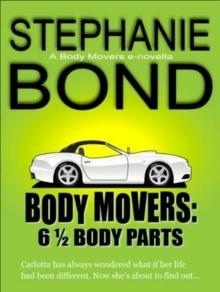 6 1/2 Body Parts
6 1/2 Body Parts Got Your Number ((a humorous romantic mystery))
Got Your Number ((a humorous romantic mystery)) Baby, Hold On
Baby, Hold On I Think I Love You
I Think I Love You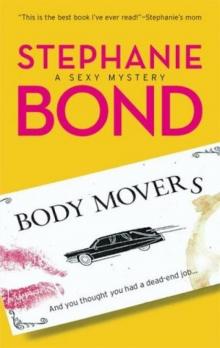 Body Movers
Body Movers Our Husband
Our Husband Once Upon a Valentine
Once Upon a Valentine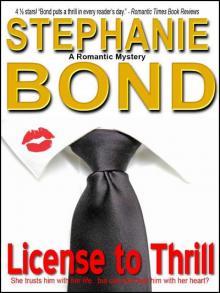 License to Thrill (a romantic mystery)
License to Thrill (a romantic mystery)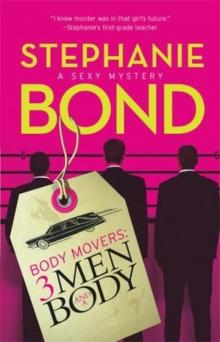 3 Men and a Body
3 Men and a Body In Deep Voodoo
In Deep Voodoo Entice Me Box Set: The Truth About Shoes and MenCover MeMy Favorite Mistake
Entice Me Box Set: The Truth About Shoes and MenCover MeMy Favorite Mistake Got Your Number
Got Your Number Baby, Don't Go
Baby, Don't Go Sand, Sun...Seduction!
Sand, Sun...Seduction! Wife Is A 4-Letter Word
Wife Is A 4-Letter Word 2 Bodies for the Price of 1
2 Bodies for the Price of 1 Baby, Drive South
Baby, Drive South My Favorite Mistake
My Favorite Mistake Body Movers: 2 Bodies for the Price of 1
Body Movers: 2 Bodies for the Price of 1 Coma Girl: part 1
Coma Girl: part 1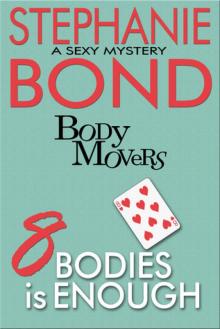 8 Bodies Is Enough
8 Bodies Is Enough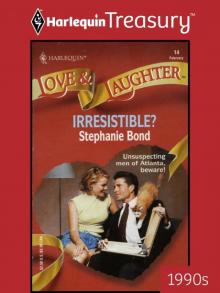 Irresistible?
Irresistible? Too hot to sleep
Too hot to sleep Two Sexy!
Two Sexy! Manhunting in Mississippi
Manhunting in Mississippi 7 Brides for 7 Bodies
7 Brides for 7 Bodies Coma Girl: Part 6 (Kindle Single)
Coma Girl: Part 6 (Kindle Single) 6 Killer Bodies
6 Killer Bodies Body Movers: 3 Men and a Body
Body Movers: 3 Men and a Body Seeking Single Male
Seeking Single Male Love So Tender: Taking Care of BusinessPlay It Again, ElvisGood Luck Charm
Love So Tender: Taking Care of BusinessPlay It Again, ElvisGood Luck Charm Love Can Be Murder (boxed set of humorous mysteries)
Love Can Be Murder (boxed set of humorous mysteries)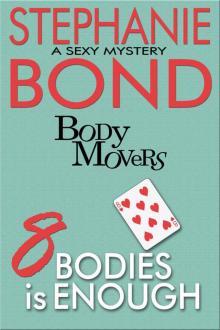 8 Bodies is Enough--for Amazon
8 Bodies is Enough--for Amazon Her Sexy Valentine
Her Sexy Valentine Baby, I'm Back (a Southern Roads short story)
Baby, I'm Back (a Southern Roads short story) Stop the Wedding!
Stop the Wedding! Too Hot to Print
Too Hot to Print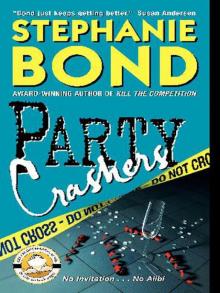 Party Crashers
Party Crashers Club Cupid
Club Cupid Coma Girl: Part 4 (Kindle Single)
Coma Girl: Part 4 (Kindle Single)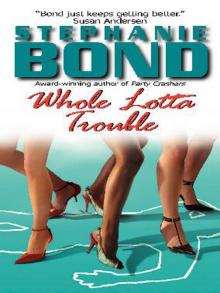 Whole Lotta Trouble
Whole Lotta Trouble Almost a Family
Almost a Family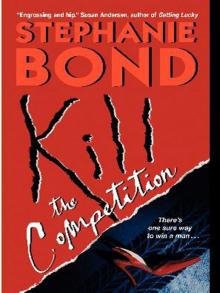 Kill the Competition
Kill the Competition Kids Is A 4-Letter Word
Kids Is A 4-Letter Word Baby, Come Home
Baby, Come Home Voodoo or Die
Voodoo or Die Baby, I’m Yours
Baby, I’m Yours Mad About You (boxed set of beloved romances)
Mad About You (boxed set of beloved romances) You Can Leave Your Hard Hat On
You Can Leave Your Hard Hat On ABOUT LAST NIGHT
ABOUT LAST NIGHT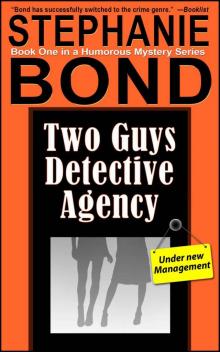 Two Guys Detective Agency (humorous mystery series--book 1)
Two Guys Detective Agency (humorous mystery series--book 1) IT TAKES A REBEL
IT TAKES A REBEL Coma Girl: part 3 (Kindle Single)
Coma Girl: part 3 (Kindle Single)